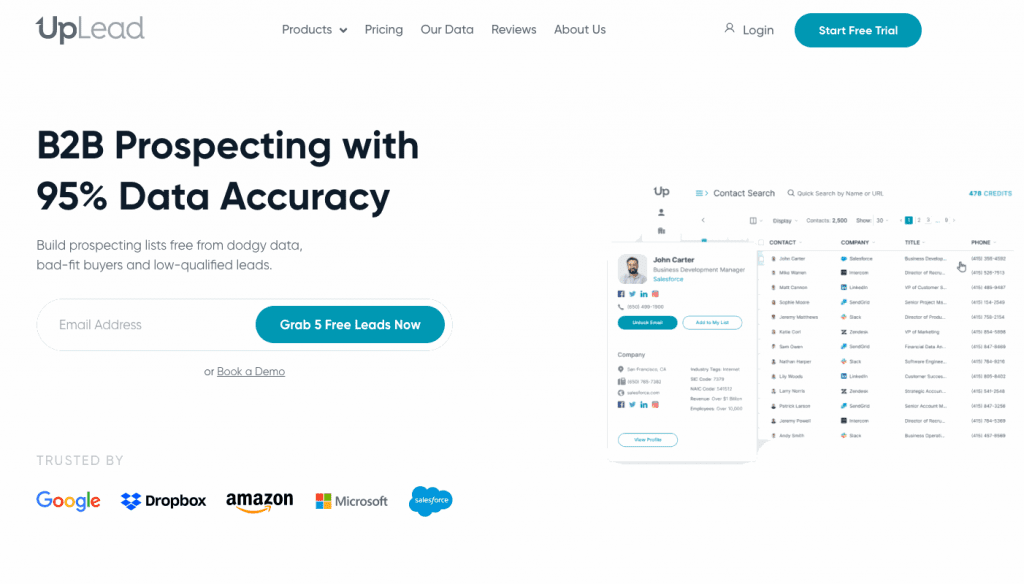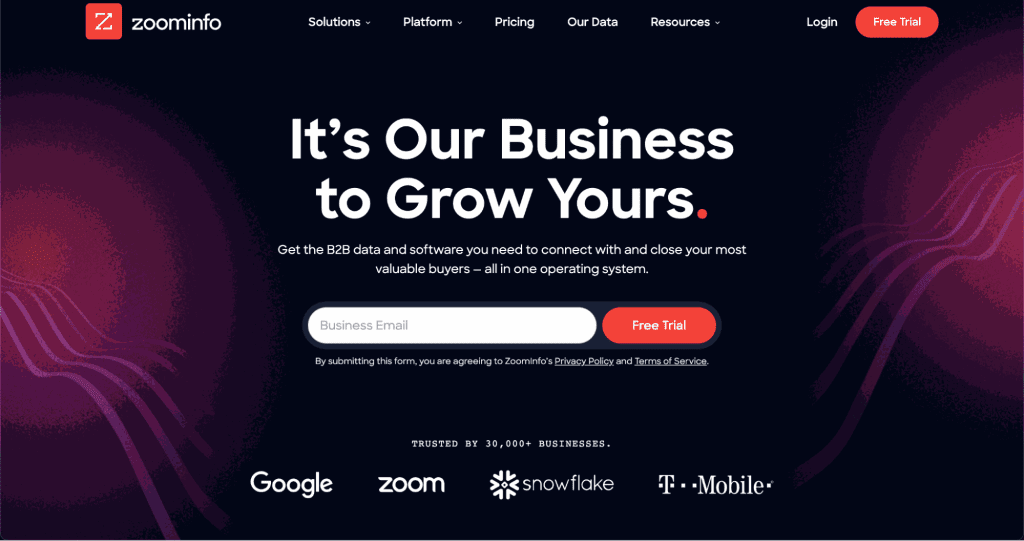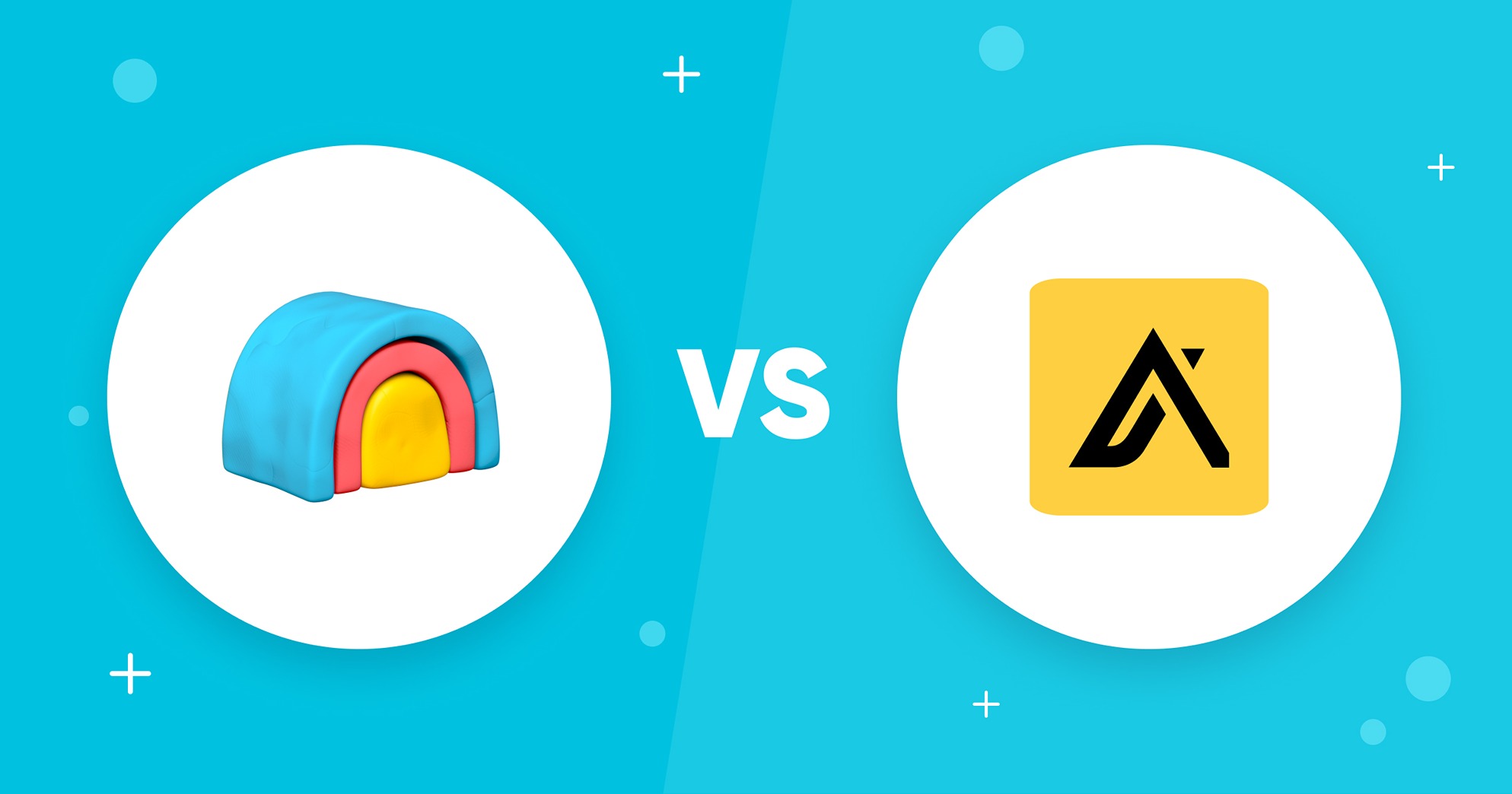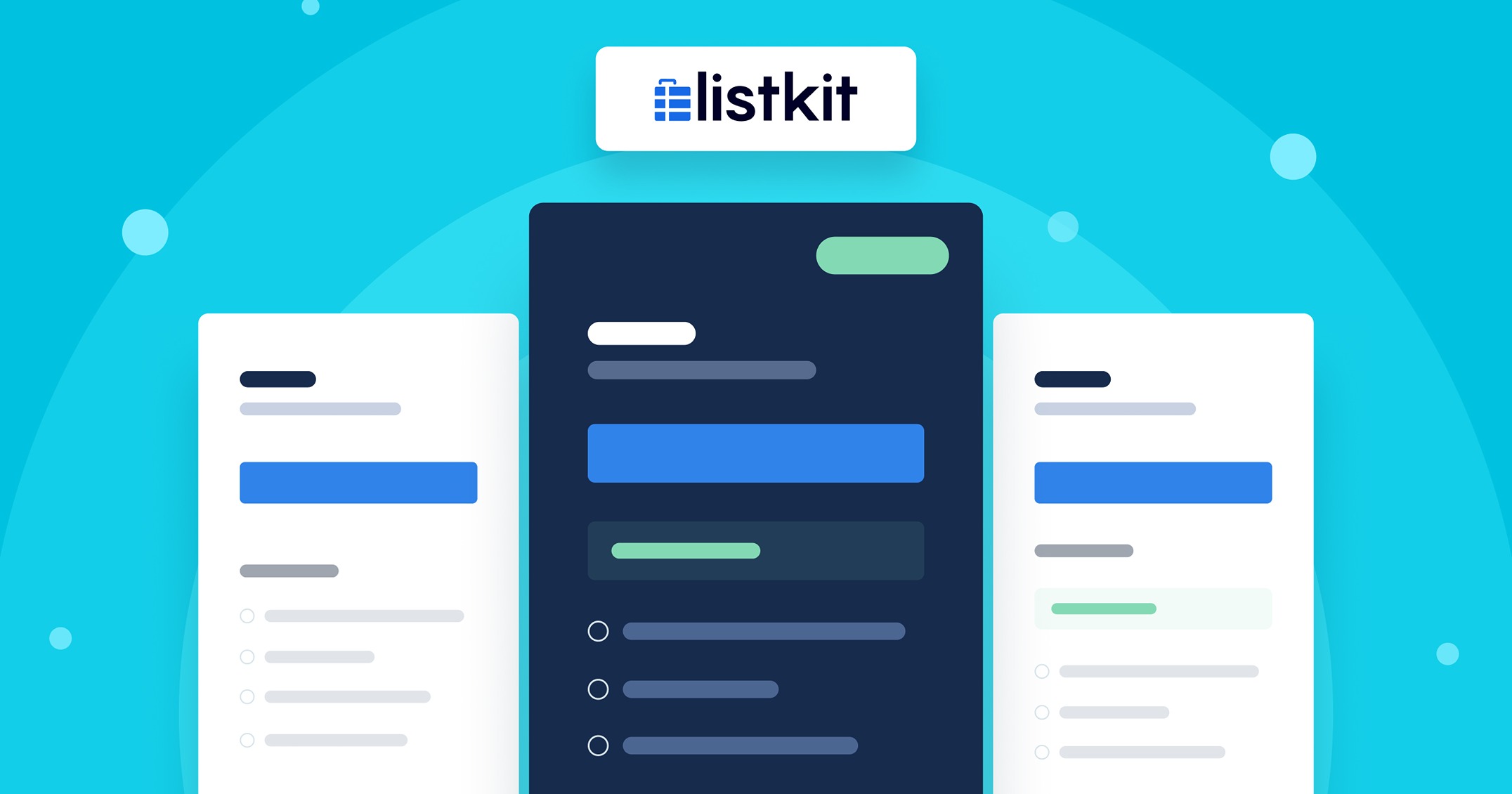Apollo.io is one of the most popular B2B sales intelligence platforms today. Its contact database provides companies with high-quality leads that their sales teams can convert into paying customers. But is Apollo.io as good as advertised? What about its pricing plans? How does it compare to the competition?
In this article, we’ll cover everything you need to know about this tool, including the following:
- What is Apollo.io?
- Apollo.io key features
- Apollo database
- Apollo.io pricing and plans
- Apollo.io integrations
- UpLead: the best Apollo.io alternative
- More Apollo.io alternatives
- Frequently asked questions
Let’s get started.
What is Apollo.io?
Apollo.io is a sales intelligence platform that makes lead generation easy. It has a contact database with over 220 million global contacts, including 30+ million companies. The platform has many features that make finding and engaging with the best possible prospects simple. It’s similar to email finders such as UpLead.
Apollo.io is ideal for business-to-business companies that want a comprehensive lead-generation solution. It’s scalable and is used by businesses of all sizes. The platform can benefit sole proprietors, new startups, small and medium-sized businesses, and large enterprises.
Apollo.io’s strengths are its robust features, large database, and competitive pricing. It also compares well with other lead-generation tools on the market. We’ll go into further details below.
Apollo.io Key Features
Apollo.io has several valuable features that make searching through its extensive contact database easy. Over 200 search filters include firmographic, demographic, and technographic data points.
Some firmographic data points include annual revenue, business type, number of employees, geographic location, and organizational charts. This information can help you uncover the best brands for your marketing and sales teams to target in their campaigns.
The technology tracking feature allows you to search through the contact database and find which technologies a company uses. For instance, you can find out which brands have technology stacks, including Salesforce, Apollo.io, and Mailchimp.
The demographic data points include age, job title, business email address, direct dial, mobile number, and more. You can use these search filters to uncover key decision-makers at your target companies. The real-time buying intent feature alerts you when your prospects search for the solutions you provide.
There are also built-in engagement features that can help your marketing and sales teams qualify and close deals. Strategic sequencing automates emails, phone calls, and general tasks. A/B testing helps optimize your approach to find the best strategies while built-in safeguards prevent spamming or sending duplicate emails.
Strong integration guarantees that your prospect data, contact information, and calls are synced to your company’s CRM. Apollo.io also provides analytics and update alerts. You’re notified when your prospects change jobs or contact information and when your target companies are increasing funding.
A comprehensive analytics dashboard keeps you updated on your campaign’s performance. All your critical notifications, alerts, and data are kept in one accessible place. Based on behavioral and demographic factors, a real-time lead-scoring feature helps you prioritize the best prospects.
Here’s a summary of Apollo.io’s main features:
- 200+ search attribute filters
- Technology tracking
- Demographic data points
- Firmographic data points
- LeadSift intent data
- Automated sequences
- A/B testing
- Apollo.io Google Chrome extension
- LinkedIn extension
- Gmail extension
- CRM integration
Apollo Database
A B2B lead generation tool is only as good as its contact data. Apollo.io’s database features more than 220 million global contacts, including 82+ million contacts outside the United States. In total, there are over 30 million companies within the database.
The platform offers verified email addresses, mobile numbers, and direct dials, which can be synced to your company CRM. The data attributes include firmographic points, such as the number of employees, revenue, VC funding, location, etc. You can find demographic information on individual employees and key decision-makers and which technology is being used at specific companies.
Apollo.io’s data is accurate and regularly updated. Email addresses are verified using a five-step process. Direct dial and mobile numbers are validated via third-party vendors and Apollo.io’s dialer software. The platform guarantees accurate data; they even offer a refund on every bounced email.
Apollo.io’s database pulls from several verified sources, including hundreds of millions of scraped websites. The platform also uses machine learning algorithms and a proprietary data network.
Apollo.io Pricing and Plans
Apollo.io has four different pricing plans: Free, Basic, Professional, and Custom. They vary based on price, credits, and features. We’ll cover each plan below.
Free
The Free plan includes 600 email credits per year, which is 50 per month. There’s a sending limit of 250 emails per day. You’re also limited to two basic sequence automation and one purchase intent topic. The Free plan is best for new startups, sole proprietors, and small businesses.
Here are the features included in the Free plan:
- Two basic sequence automation
- Basic search filters
- Purchase intent (one topic limit)
- LinkedIn extension
- 250 per day email send limit
- Gmail extension
- Tracking for email replies and meetings
- HubSpot integration (pull only)
- Salesforce integration (pull only)
- Outreach integration
- SalesLoft integration
- Zapier integration
- CSV exporting
- API access (limited)
Apollo.io’s Free plan doesn’t have nearly as many features compared to its paid plans. It’s also more restrictive regarding the email send limits, purchase intent topics, and basic sequence automation.
Basic
The Basic plan costs $39 per user per month if billed annually. (It costs $49 per user per month if billed monthly.) You’re given 2,400 email credits per year, which is 200 per month. Unlike the Free plan, there are no sending or sequence limits. However, you’re limited to six purchase intent topics.
This plan best suits sole proprietors and small to medium-sized businesses with many customers. The Basic plan includes all of the features from the Free plan, as well as the following:
- Unlimited sequences
- SendGrid uncapped sending limits
- Advanced search filters
- Purchase intent (six topics limit)
- Pre-built advanced dashboard and reports
- Complete email provider integration
- Custom fields
- Opportunities
- Tracking for email clicks and opens
- Rules engine process builder
- Advanced Salesforce integration (bi-directional)
- Advanced HubSpot integration (bi-directional)
- Greenhouse integration (pull only)
The Basic plan is the least expensive of the paid plans. If the Free plan isn’t enough for you, but your budget is limited, this is the plan for you. It has most of the features you need for a full-scale email outreach campaign.
However, if you intend to use cold calling as part of your strategy, you may want to consider upgrading to the Professional plan; the Basic plan doesn’t come with a dialer or call recording feature.
Professional
The Professional plan is Apollo.io’s most popular tier. It costs $79 per user per month if billed annually. (It’s $99 per user per month if you pay on a month-by-month basis.) You’re given 600 mobile credits per year, which is 50 per month. Email credits, on the other hand, are unlimited.
The Professional plan is best for medium-sized companies. It includes all of the features from the Basic plan, as well as the following:
- Select 100 new data records at a time
- Advanced Greenhouse integration (bi-directional)
- A/B testing
- Purchase intent (6 topics limit)
- Intent filters
- Automated manual task sequences
- Dialer
- Call recordings
- Custom stages
The Professional plan has more features than the Free and Basic plans. It gives you call functionality, which isn’t available in the less expensive options. However, it still has certain limitations. You can only select up to 100 new data records at once. Purchase intent topics are also restricted to six.
If these limitations are an issue, you should consider the Custom plan.
Custom Plans
The Custom plan has a minimum cost of $5,000 per year. There’s no price difference between paying annually or monthly. You get unlimited email credits and a customized amount of mobile credits. The Custom plan is most suitable for large-sized enterprises that need a scalable option.
The Custom plan includes all of the features from the Professional plan and adds the following:
- Select 10,000 new data records at a time
- Data Enrichment
- Job change alerts
- Purchase intent (custom topics limit)
- Intent filters
- International dialing
- Call transcriptions
- Local calling presence
- Customizable reports
- Permission profiles
- API access (advanced)
The Custom plan is the most advanced that Apollo.io has to offer. It provides you with the platform’s complete suite of features. The other plans cannot compare when it comes to functionality.
Apollo.io Integrations
Companies today are using several tools to optimize their end-to-end sales process. New software applications need to integrate with your existing technology stack. Apollo.io syncs seamlessly with the majority of popular cloud-based platforms.
LinkedIn is an important social media platform for businesses and professionals. Apollo.io integrates with the site, allowing you to find verified email addresses, direct dials, and mobile numbers easily. You can also send relevant data straight to your CRM and send InMail from the Apollo.io interface.
Apollo.io also works with email messaging platforms like Gmail and Outlook. You can track clicks and opens and use pre-made templates to save time. This helps you measure the performance of your email marketing campaigns. You can make strategic decisions to optimize your approach based on the data you receive.
CRM platforms like HubSpot and Salesforce also integrate with Apollo.io. You can search the database and send leads and contact information directly to your company’s CRM. You can also enrich your existing data to ensure that it’s accurate.
Here are some of the tools that Apollo.io integrates with:
- Gmail
- Outlook
- SalesLoft
- Outreach
- Marketo
- SendGrid
- Zapier
- HubSpot
- Salesforce
UpLead is the Best Apollo.io Alternative
Apollo.io is a great sales intelligence platform, but it has drawbacks. Questions have been raised about its data accuracy. The good news is there are plenty of great alternatives to consider; the best of the bunch is UpLead.

UpLead is a cloud-based B2B lead generation tool that makes it easy for companies to find high-quality leads. The web-based platform provides its customers with a large B2B contact database. Sales teams can easily create targeted prospect lists to populate their pipelines.
The UpLead database includes over 160 million B2B email addresses, direct dials and mobile numbers. There are also 16 million company profiles and 16,000+ technologies tracked. UpLead also comes with a 95% data accuracy guarantee.
UpLead is the best Apollo.io alternative because it has unrivaled data accuracy. Many business intelligence databases are inaccurate, including incorrect numbers and email addresses that bounce. UpLead offers competitive pricing; its scalable plans suit companies of all sizes. UpLead is a highly effective tool for all types of businesses and industries.
Key Features
UpLead has robust features, including 50+ search filters you can use to sift through its extensive database. These include demographic data on key decision-makers and employees and firmographic and technographic data.
For example, you can search for businesses based on the number of employees, annual revenue, industry, and geographic location. You can also observe organizational charts and find which technologies are used within each company.
These are just some of UpLead’s capabilities. Here’s a more comprehensive list of features:
- 160+ million B2B contacts with email addresses
- 16+ million company profiles
- 16,000+ technologies tracked
- 95% data accuracy guarantee
- 50+ search filters
- Real-time email verification
- Purchase intent data
- Organizational charts
- Data Enrichment
- Google Chrome extension
- Competitor intelligence
- CRM integration
Pricing
UpLead has three pricing plans: Essentials, Plus, and Professional. You can choose to pay annually or monthly. There’s also a free trial available. Here’s what you need to know about each plan:
- Essentials Plan: Costs $74 per month if billed annually or $99 per month if billed monthly. You get one user, verified phone numbers and email addresses, data enrichment, competitor intelligence, and more.
- Plus Plan: Costs $149 per month if billed annually or $199 per month if billed monthly. You get one user, all of the Essentials plan features, technographic, advanced search filters, and more.
- Professional Plan: Costs $299 per month if billed annually or $399 per month if billed monthly. You get a team account with up to five users. Includes all the Plus plan features, search filters, full API access, competitor intelligence, and more.
The UpLead free trial allows you to test drive this lead generation platform. You can download five free leads from the UpLead B2B contact database. Sign up for UpLead’s free trial today.
More Alternatives to Apollo.io
There are many Apollo.io alternatives to consider. We’ve included two more popular options below.
ZoomInfo

ZoomInfo is a B2B intelligence tool that simplifies the lead generation process. Customers can find high-intent prospects through the platform’s expansive contact database. Several useful features make prospecting with ZoomInfo effortless.
ZoomInfo’s B2B contact database has over 129 million business email addresses and 50+ million US-based direct dials. The lead builder gives you granular targeted searches to create targeted prospect lists. Organizational charts uncover the decision-making hierarchy of your target companies. These are just some examples of what you’ll find in ZoomInfo’s capable suite of features.
ZoomInfo is best suited to larger enterprises with the budget to cover the high cost. Compared to other B2B lead generation tools, ZoomInfo is very expensive. If you’re a sole proprietor, new startup, or small business, you may want to consider looking elsewhere for a more moderately priced business intelligence tool.
Key Features:
- Lead builder
- Organizational charts
- Purchase intent data
- ZoomInfo Chrome extension
- Phone dialer
- Email automation
- Tailored prospect lists
- Real-time alerts and notifications
- Lead enrichment
- Deep integrations
- Website chatbot
Pricing:
ZoomInfo is one of the most expensive data providers on the market. Its cheapest plan starts at $15,000 per year. There’s also a free trial available.
Lusha

Lusha is a web-based B2B intelligence platform that offers customers access to a large B2B contact database. The tool provides extensive features that allow for granular search results. You can sift through the database and create targeted prospect lists.
The Lusha database features 100+ billion business email addresses, 60+ million decision-maker contacts, and 15+ million full company profiles. There are also 50+ million decision-maker direct dials.
Lusha is best for small and medium-sized businesses. One major drawback is the low database accuracy of 81%. UpLead, in comparison, has a 95% data accuracy guarantee.
Key Features:
- 100+ million business email addresses
- 60+ million decision-maker contacts
- 15+ million full company profiles
- 12 contact attributes
- 25 company attributes
- CRM integration
- Lusha Chrome extension
- Person API
- Company API
Pricing:
There are three Lusha pricing plans: Pro, Premium, and Scale. Pro, the cheapest plan, costs $29 per user per month. Premium is priced at $51 per user per month, and Scale is a custom plan for larger enterprises.
There’s no free trial, but there’s a free plan available. It comes with five credits per month. UpLead is a great Lusha alternative to get started.
FAQs About Apollo Pricing
Apollo.io has a free plan. It gives you 600 email credits per year, around 50 every month. There’s a daily send limit of 250 emails, a limit of two basic sequence automation, and one buying intent topic. The Apollo.io free plan is great for very small businesses, new startups, and sole proprietors. It’s also an excellent way to test the tool before purchasing a paid plan.
Apollo.io isn’t a one-time purchase. Rather, it’s a recurring cost that can be paid annually or on a month-by-month basis. The Basic Plan is $39 per user per month when billed annually. If paid monthly, it’s $49 per user per month. The Professional plan is $79 per user per month when billed annually. On a month-by-month basis, it’s $99 per user per month.
Apollo.io isn’t a CRM platform but a sales intelligence platform. It combines prospecting with sales and marketing capabilities so that you can find and engage with high-quality leads. It might be mistaken for a CRM, but it lacks several features that a CRM platform typically has. Apollo.io integrates with CRMs like HubSpot and Salesforce.
What You Need to Remember About Apollo.io Pricing
Apollo.io is a popular B2B sales intelligence tool used by many businesses. It combines prospecting, marketing, and sales features so that you can find high-intent leads and engage with them effectively.
Like any other software, Apollo.io has its strengths and weaknesses. This article covered everything you need to know about the platform, including its key features, integrations, pricing plans, and database. We also included a few of the best alternatives to choose from.









